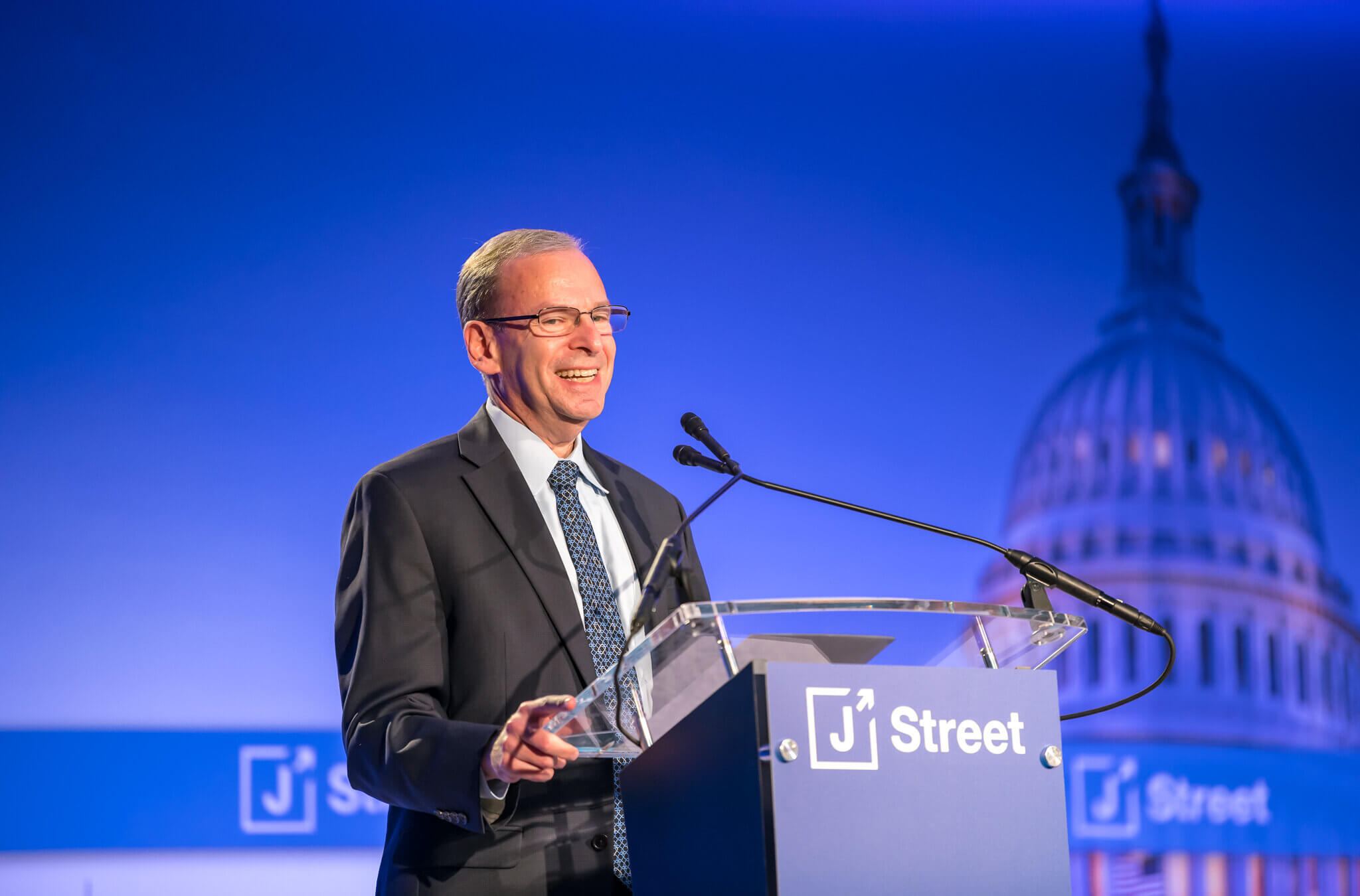J Street to AIPAC: Let’s make a deal
President Jeremy Ben-Ami said the group will keep its focus on foreign policy, though it highlighted domestic issues in 2022

J Street President Jeremy Ben-Ami at J Street’s 2022 national conference in Washington, D.C., on Dec. 4, 2022. Courtesy of J Street
In the wake of the midterm elections and ahead of the 2024 election cycle, the head of the pro-Israel advocacy group J Street is calling on the American Israeli Public Affairs Committee to cease its political activities, calling the group’s heavy spending in partisan primaries “not productive.”
J Street and AIPAC, which takes a more conservative view of Israel’s conflict with the Palestinians, tussled in the midterms, each spending millions in House races to boost its preferred candidate.
“If they pull back, if they stop and say they will not do this again in 2024, we will not spend money as a super PAC,” J Street President Jeremy Ben-Ami said in a recent interview. “We expect to see them disarm first. We’re not going to unilaterally disarm.”
AIPAC is not inclined to take J Street up on the offer. Its spokesperson, Marshall Wittman, said in an interview that the group “will not be deterred” in its efforts “by those who would undermine support for our democratic ally, Israel.” He added, “We are proud of the efforts of AIPAC activists to help elect pro-Israel Democratic and Republican candidates and defeat detractors of the U.S.-Israel relationship.”
Both advocacy groups increased their political activities overall in the 2022 election cycle, funneling money into highly competitive races through their political action committees. And despite endorsing at least 48 of the same Congressional candidates, they faced off in several contests, in Michigan, Ohio and elsewhere. They also fought a war of words over AIPAC’s political strategy, as J Street turned much of its attention to domestic issues, including combatting anti-democracy movements in the U.S.
AIPAC faced backlash from many quarters in recent months for endorsing Republicans who refused to certify the election of Joe Biden as president, and for mass spending in high-stakes Democratic primaries.
In total, AIPAC’s United Democracy Project super PAC spent $28 million, including $1 million in the general election against Rep.-elect Summer Lee, a progressive Democrat from Pennsylvania. J Street invested more than $1.8 million through the J Street Action Fund.
“I don’t think it serves us well,” Abe Foxman, the former longtime national chair of the Anti-Defamation League, said of the groups’ election spending and the Jewish community. “I would be more comfortable if they went back to advocacy.”
J Street shifts
J Street, founded 15 years ago, has been known for its staunch advocacy for a two-state solution for Israelis and Palestinians. It held its annual conference in Washington, D.C., this week, with an emphasis on fighting anti-democratic forces in the U.S. and in Israel. The group recently added “pro-democracy” to its tagline and focused its midterm efforts on domestic issues, including abortion and immigrant rights. It has strongly protested those who supported the Jan. 6 riot at the Capitol in 2021 and members of Congress who refused to vote to certify President Joe Biden’s election.
Ben-Ami said that AIPAC’s work to defeat critics of Israel’s policies in the Democratic primaries “was a waste of tens of millions of dollars and could be much better used.”
Foxman said that when pro-Israel lobbies spend heavily in key races “it tarnishes the Jewish community” and “gets both organizations into trouble” by making it seem they are meddling in affairs not their own.
Ben-Ami said Israeli-Palestinian peace, opposition to settlements in the occupied West Bank and oversight of U.S. military assistance to Israel remain top priorities for his group, despite its advocacy on domestic issues. “J Street’s role is going to be to push the Biden administration to go as far as it possibly can” to demonstrate it is serious about its commitment to a two-state solution.
Trolling
J Street’s agenda conflicts with AIPAC’s on some issues, and aligns on others. But overall, if J Street’s three-day Washington conference is any indication, the two groups remain rivals.
AIPAC trolled J Street during the conference, publishing a dozen tweets through its official handle, and claiming J Street “is not pro-Israel.”
While he called for a truce in outside spending, Ben-Ami said J Street will play “a very active role” in the 2024 elections, pointing to a 91% success rate this year.
“We were very, very pleased with the races where we got involved and the fact that our endorsement seemed strategically wise, and to be of help to people in very close races,” he said.
“And so we will continue to look for races where we can make a difference.”
A message from our CEO & publisher Rachel Fishman Feddersen
I hope you appreciated this article. Before you go, I’d like to ask you to please support the Forward’s award-winning, nonprofit journalism during this critical time.
We’ve set a goal to raise $260,000 by December 31. That’s an ambitious goal, but one that will give us the resources we need to invest in the high quality news, opinion, analysis and cultural coverage that isn’t available anywhere else.
If you feel inspired to make an impact, now is the time to give something back. Join us as a member at your most generous level.
— Rachel Fishman Feddersen, Publisher and CEO